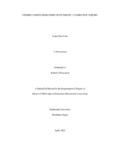
Please use this identifier to cite or link to this item:
https://hdl.handle.net/20.500.14301/90| Title: | UNDERSTANDING BEHAVIORS OF STUDENTS: A NARRATIVE INQUIRY |
| Authors: | Joshi, Gopal Datt |
| Citation: | Joshi, G. D. (2022). Understanding behaviors of students: A narrative inquiry. [Unpublished dissertation], Kathmandu University. |
| Issue Date: | 5-Apr-2022 |
| School: | SOED |
| Department: | DOEL |
| Level: | M.Phil. |
| Program: | MPhil in Educational Leadership |
| Abstract: | The study was conducted with the main purpose of exploring the perceptions and practices of school principals in managing the behaviors of students. I purposely selected 3 school principals of institutional schools of Kathmandu valley and collected their stories as data through interview. I used narrative inquiry as my research method to explore their stories through interpretive paradigm where I followed the theory of behaviorism and positive behavior support plan of Walker et al. as the lens. Through the exploration of my participants‘ narratives, I got to know that behavior problems are common and natural. I also discovered that school principals have inadequate knowledge about behavior problems, its complexity (major and minor cases) and multi-layer connections (home, school, teachers, society, and peers). It also revealed that school principals use negative instructions, do practice of punishment over praise and strive to change the nature of students rather than building their nature. It gave me insights to appreciate the diverse need and nature of students and understand their feelings. Similarly, I also discovered that there are three common practices of managing the behavior problems of students (prevention, intervention and investigation) where school principals mostly practice intervention. This gave me knowledge that school principals and educators need to practice on creating positive and supportive school climate (prevention); monitor, supervise and guide students to get involved in creative and productive things through reward and reinforcement (intervention) rather than beating, torturing, giving warning letters, suspending and expelling and, gather and create stock of information as and when students‘ behavior problems were occurred and explore how and why they occurred (investigation) rather than collecting behavior problems related evidences with negative intention of punishing, suspending and expelling the students from school. The study concluded that managing behavior problems of the students require thorough and intensive understanding of the complex nature and multi-layer connections of behavior problems and also to manage them positively by creating more encouraging and supportive environment at school rather than enforcing coercive means of punishment over reward and reinforcement. |
| URI: | http://101.251.6.110:8080/handle/20.500.14301/90 |
| Appears in Collections: | Dissertations |
Files in This Item:
| File | Description | Size | Format | |
|---|---|---|---|---|
| MPhil_Ed._Leadership_Gopal Datt Joshi.pdf | 1.04 MB | Adobe PDF |  View/Open |
Items in DSpace are protected by copyright, with all rights reserved, unless otherwise indicated.